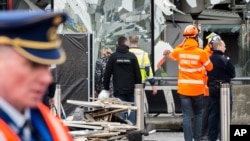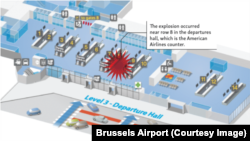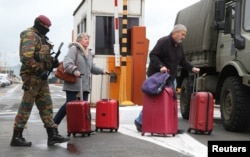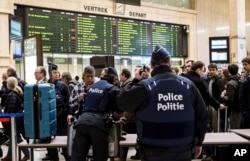Tuesday’s terrorist bombings in Brussels featured a new tactic for Islamic State militants, attacking passengers in a departure hall where airport security is at its weakest.
Transport terminals across Europe ramped up their security measures following the Brussels attacks with many mounting highly visible armed patrols near check-in desks to reassure passengers, but officials in several European countries are saying that there will now have to be a major overhaul of airport security in the light of Tuesday’s blasts.
It is not the first time Middle Eastern terrorists have targeted a departure hall, but it has not been done since 2007 when radical Islamists smashed a Jeep Cherokee loaded with propane canisters through the doors of the Glasgow International Airport terminal. The only fatality was one of the assailants.
In even bloodier attacks in 1985, the Palestinian militant group of Abu Nidal shot at travelers checking in for El Al flights in the main departure halls at the Rome and Vienna airports, killing 19, including a child, and injuring 140 people.
Abu Nidal’s operations were notorious for their random cruelty and IS militants are now emulating them as they seek out the easiest locations and most vulnerable people to target, say analysts, who predict the Brussels attack will lead to far-reaching consequences for aviation security at Western airports.
According to Shashank Joshi, a senior research fellow at the Royal United Services Institute, a British think tank, IS chose to hit a departure lounge for the same reasons Abu Nidal chose to do so, “to maximize disruption and maximize the international profile of the attack.”
Major security review
He says the Brussels airport attack will likely prompt a major review of airport security in Europe and the United States. He predicts a debate about whether people should have to go through routine checks before being allowed to enter passenger terminals, as is the case with most Mideast and Asia airports, where long lines build up.
“We are likely to see a review of airport security as there is political expectation in these circumstances that something must be done and defenses increased, and if you are caught out twice there will be political hell to pay,” Joshi says.
But he cautions against placing too much faith in security procedures observed at airports in the Middle East and Asia, arguing they amount to “rather pointless security theater.” He adds: “If a major attack went off just outside a security check, which is entirely possible, you would have all the disruption you had inside the terminal.”
He argues the focus at airports has to be on ensuring the security and safety of the aircraft.
Authorities at Heathrow in Britain say in light of the Brussels attack they are ramping up security in the departure and arrivals halls and working with police to provide a high-visibility presence.
London’s other major airport, Gatwick, is doing the same. “As a result of the terrible incidents in Brussels, there will be increased police and security patrols in and around Gatwick Airport,” airport bosses said.
Soft targets
But the Brussels attacks underscore the huge challenge facing European security services, how to prevent attacks on the softest of targets as jihadists become even more random in what and who they attack far from battlefield action.
From massacring vacationers relaxing and strolling on North Africa’s Mediterranean beaches to gunning down shoppers, diners, and concert-goers in Paris, IS is making everyone a target.
But a federation representing European airports, Airports Council International Europe, warned in a statement: “The possible adoption of additional security measures such as checks on persons and goods entering airport land-side spaces could be disruptive and actually create new security vulnerabilities. By displacing the gathering of passengers and airport visitors to spaces not designed for that purpose, such measures would essentially be moving the target rather than securing it.”
What is alarming intelligence officials on both sides of the Atlantic is how IS networks in Europe in recent months have been able to pull together big plots involving several attackers without security services discovering the plots.
Intelligence officials on both sides of the Atlantic say this chapter of “low-grade” 24/7 terrorism with any Westerner a target, wherever he or she might be, needs to be answered with more intrusive intelligence and surveillance and a dramatic increase in resources.
But governments are facing a headwind when it comes to upping electronic surveillance. Public resistance to more intrusive methods and data collection has increased in the wake of Edward Snowden’s revelations about the scale of the U.S. National Security Agency’s metadata surveillance.
But only good intelligence gathering can stop terror attacks before they begin, meanwhile jihadist targets are getting ever more random.














